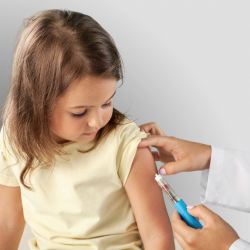Good news. Important information on vaccines is getting through to Americans – and that's a big win for science and public health in the United States.
New data released today shows that more than eight in ten "support requiring all healthy schoolchildren to be vaccinated for measles, mumps and rubella." In addition, an overwhelming number of adults – 88 percent – "believe that the benefits of these inoculations outweigh the risks."
Results of a survey conducted by the Pew Research Center before the November elections show that 82 percent of Americans believe in the benefits of childhood vaccinations. Additionally, the survey revealed that those with greater access to accurate, evidence-based information understand the benefits, while those with "lower knowledge about science topics" tend to believe in health risks that don't exist.
"In addition to parents of young children, this analysis finds that adults under age 30, blacks and people with lower knowledge about science topics see a higher risk of side effects or lower preventive health benefits from this vaccine," said Cary Funk, the lead author and Associate Director of Research.
 And because others in proximity to an child who receives a vaccination can benefit, knowing which groups do – and do not – embrace childhood vaccines is vital.
And because others in proximity to an child who receives a vaccination can benefit, knowing which groups do – and do not – embrace childhood vaccines is vital.
"Public health benefits from vaccines hinge on very high levels of immunization in the population," Funk added, "so it's important to understand which groups hold reservations about the MMR [measles, mumps and rubella] vaccine."
Among the groups expressing reservations about the effectiveness of vaccinations are, unfortunately, parents of young children, who should instead be the biggest advocates. Just over half of parents (52 percent) with kids up to age 4 say the "risk of side effects from the MMR vaccine is low." It's somewhat a shame that number is not higher. And as displayed in the accompanying chart, courtesy of the Pew Research Center, for those adults with older children or none under age 18, the risk they perceive lessens as their kids get older.
By comparison, when you combine those Americans who believe the risk of side effects is medium or high, the figure is 43 percent. Lower, yes, but not low enough, because the threats are not there.
Overall, 73 percent of Americans believe their are "high preventive health benefits from use of MMR," and 66 percent see a "low risk of side effects."
It's pretty well known that there are misguided folks out there, several with a public following, who pose a health threat to us all by trying to link childhood vaccinations to autism. Once again, we urge you to give these disreputable people no quarter. They are simply wrong. And just in case you know parents who incorrectly believe that a connection does exist, please direct them to this authoritative web page at the Centers for Disease Control and Prevention, titled "Vaccines Do Not Cause Autism."

